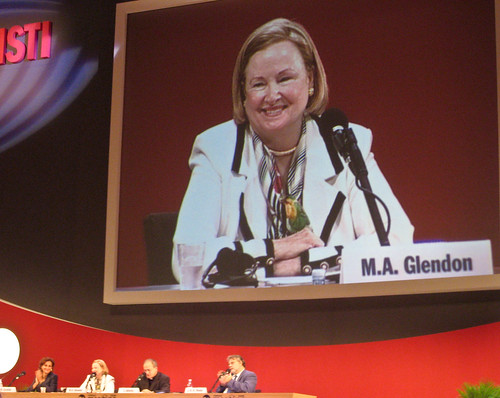Well, it looked a lot like politics as usual today with President Obama's signing of an Executive Order that reversed what is known as the Mexico City Policy. It is called this because President Reagan announced it in a speech he gave in 1984 at the U.N. International Conference on Population held in Mexico City. The Mexico City policy stipulates that no monies given by the U.S. government to foreign NGOs can be used to fund abortions or abortion-related services. The rule also prevents foreign NGOs that receive U.S. money from presenting abortion as a possibility to the women they seek to serve. Hence, the policy is known by proponents of abortion-on-demand as "the global gag rule".What it means is that the NGOs which promote the dignity of the person will be replaced by those advocating for (e.g. asserting political pressure) and providing abortion services as a means of relieving poverty in the world. Obama stated: "For the past eight years, they have undermined efforts to promote safe and effective voluntary family planning in developing countries... For these reasons, it is right for us to rescind this policy and restore critical efforts to protect and empower women and promote global economic development.”
It is important to point out that the policy does not extend to NGOs based in the United States because such a denial has been determined to be unconstitutional. The Mexico City policy was in force from 1984 until the first few days of the first Clinton Administration, when then-President Clinton overturned it by another Executive Order issued on 22 January 1993, the twentieth anniversary of the Supreme Court's unfortunate Roe vs. Wade decision. The Mexico City policy was once again put into effect with yet another Executive Order signed by Pres. Bush on 22 January 2001.
I gave a hearty guffaw to the idea put forward by a reporter for NPR, which she no doubt received from the White House Press Office, that by not reversing the Mexico City policy on the anniversary of Roe vs. Wade, Pres. Obama sought to de-politicize the issue. Wow! That is spin at its worst and least creative and most disingenuous. I agree with Ashley Horne from Focus on the Family that it is not possible to "reduce abortions by channelling more money to the abortion industry". What do we offer the world? Abortion on demand! Who does this offend? All traditional cultures. The gap widens. Besides, the right to life is not a political issue, it is not an ethical issue, it is a fundamental moral issue.
Additionally, the President apparently intends to fund the U.N. Population Fund. Jack Smith at the Catholic Key blog explains:
Appended to the president's action was a notice in which he said:Cardinal George had previously urged President Obama to keep the policy intact out of respect for life and for other cultures:In addition, I look forward to working with Congress to restore U.S financial support for the U.N. Population Fund. By resuming funding to UNFPA, the U.S. will be joining 180 other donor nations working collaboratively to reduce poverty, improve the health of women and children, prevent HIV/AIDS and provide family planning assistance to women in 154 countries.This action could be even more monstrous than the reversal of the Mexico City Policy. The U.S. government ceased funding the UNFPA after independent investigations found the agency complicit in China's coercive one-child policy - coercion that includes forced abortions.
Following the State Department's own 2002 investigation, then-Secretary of State Colin Powell wrote a letter to Congress saying, "UNFPA's support of, and involvement in, China's population-planning activities allows the Chinese government to implement more effectively its program of coercive abortion."
The Mexico City Policy, first established in 1984, has wrongly been attacked as a restriction on foreign aid for family planning. In fact, it has not reduced such aid at all, but has ensured that family planning funds are not diverted to organizations dedicated to performing and promoting abortions instead of reducing them. Once the clear line between family planning and abortion is erased, the idea of using family planning to reduce abortions becomes meaningless, and abortion tends to replace contraception as the means for reducing family size. A shift toward promoting abortion in developing nations would also increase distrust of the United States in these nations, whose values and culture often reject abortion, at a time when we need their trust and respect.
